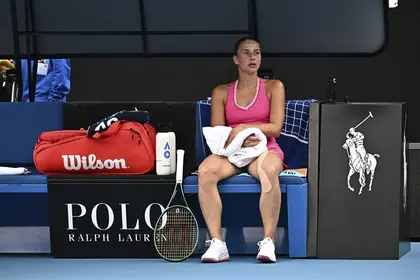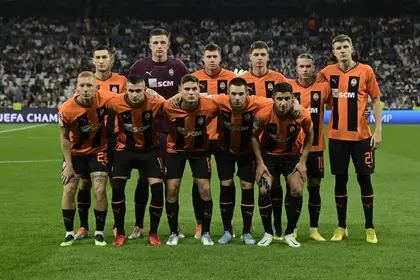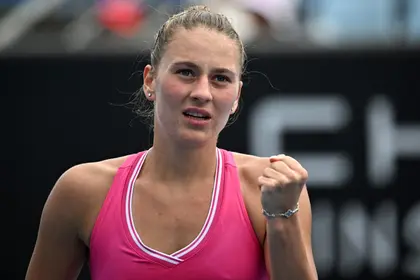Shakhtar Donetsk are now Ukraine’s wartime champions, with the club having secured the first championship title following Russia’s full-scale invasion of Ukraine in February 2022.
Despite the harrowing onslaught wreaked upon Ukrainian cities and towns by Russian forces, the power of sport endures as a universal remedy, offering respite and instilling a flicker of hope in the hearts of many people.
JOIN US ON TELEGRAM
Follow our coverage of the war on the @Kyivpost_official.
When the full-scale invasion began, Shakhtar Donetsk held the top position in the 2021/22 season, leading Dynamo Kyiv by a margin of two points. However, the conflict abruptly halted their momentum.
Ukraine's football infrastructure then fell victim to the war's devastation, suffering severe damage. Esteemed Ukrainian clubs like FC Mariupol and Desna Chernihiv were compelled to withdraw from the Ukrainian Premier League. Added to that, Ukrainian teams participating in Europe's renowned continental tournaments were obliged to host their matches outside the borders of Ukraine.
However, Ukraine was determined to continue playing sport, even in wartime. As Vadym Gutsait, Ukraine's sports minister, said in 2022: "It is very important to restore big football, like other national championships, in Ukraine. We continue to compete and cheer. We continue to fight and win. Despite everything, Ukrainian sport and the will to win on all fronts cannot be stopped. We stand firmly on the sports front."

Ukraine's Kostyuk Says Players at Australian Open Can Remind of Horrors of War
In an effort to maintain a sense of normality in daily life, President Volodymyr Zelensky granted his blessing for football to resume in the country.
Adapting to challenges
Over the past year, a series of unique circumstances have unfolded, leaving a distinct impact on both the playing field and beyond. The Ukrainian national team showcased impressive talent, narrowly missing out on World Cup qualification. Meanwhile, the Ukrainian Premier League faced considerable challenge with a prolonged nine-month shutdown.
Adding to the complexity, Ukrainian teams had to adapt to competing in European competitions on foreign soil, such as Poland. Whilst the league experienced a significant talent drain due to the ongoing war, it has provided an opportunity for promising local players to step up and shine. Notably, Shakhtar, once renowned for its Brazilian players, began fielding a team composed almost entirely of Ukrainians.
Shakhtar Donetsk, like other Ukrainian clubs, have been playing in the UEFA Champions League abroad. Due to Russia's war, they have had to adapt to their fifth “home” stadium since 2014. Despite the option to start the league season abroad, they chose to stay in Ukraine, considering it their moral obligation.
The UEFA prize money derived from European competitions has become crucial for struggling clubs in Ukraine, grappling with the repercussions of closed sponsors and a shrinking customer base during the war.
Rinat Akhmetov, Ukraine's wealthiest individual and owner of Shakhtar Donetsk, has endured substantial personal losses. Among them is Azovstal, his steel plant in Mariupol, which holds the distinction of being one of Europe's largest. This plant became a symbol of bravery, endurance, and the unwavering spirit of the Ukrainian people as Ukrainian fighters defiantly withstood weeks of Russian bombardment before the city ultimately fell in May 2022.
Valiant competitors in Europe
In addition to reviving the league, Ukrainian teams have valiantly participated in European competitions this year. Due to the war closing Ukraine’s civil airspace, the players have been compelled to endure arduous ten-hour coach journeys across the border into Poland before and after European matches. Despite the challenging circumstances, two teams, Shakhtar and Dnipro, have performed admirably. Shakhtar in particular secured a spot in the round of 16 in the Europa League by triumphing over Rennes in a penalty shootout.
Within the league, Dnipro-1 delivered an astonishing surprise with their fierce pursuit of the title, engaging in a gripping battle that lasted until the penultimate game of the season. However, the decisive match saw Shakhtar claim a commanding 3-0 victory, securing the coveted championship. I
In a season filled with surprises, even Shakhtar's rivals, Dynamo Kyiv, unexpectedly finished in 4th place, failing to emerge as serious contenders for the title.
The last time a club other than Dynamo Kyiv or Shakhtar Donetsk triumphed in the league was in 1992 when Tavriya Simferopol made history as the inaugural champions of independent Ukraine. Since then, both Dynamo and Shakhtar have held a steadfast grip on the league titles, forming an enduring oligopoly. Dnipro-1 came so close to breaking that oligopoly as surprising contenders, but came short in the end.
Nonetheless, an engaging football season holds importance for Ukrainian society as it provides entertainment and a sense of unity. Even for soldiers on the front line who watch national team matches on their phones or small TVs in the trenches, it serves as a reminder of what they are fighting for – the freedom for people to live their lives with a sense of normality. It brings a ray of hope and serves as a shared experience that brings people together across the nation.
Matches often now begin with a moment of silence to honor those who have fallen. At times, games are temporarily paused due to air raid alarms. Shakhtar Donetsk, in a heartfelt gesture, expressed gratitude towards the Armed Forces of Ukraine (AFU) for making it possible for Ukrainian football to be played in the country.
Skeptics frequently downplay the relevance of sports in shaping a nation and its citizenry. Nevertheless, within the seemingly uncomplicated realm of a football match lies the inherent capacity for deep-rooted connections and a wellspring of national sentiment.
Ukrainian football remains an emblem of optimism against a backdrop of widespread loss, devastation, and conflict, affording a fleeting respite from the harsh realities of daily life. Every time Ukrainians take to the field to play football, it is a small act of defiance, but it has provided Ukrainians with one more symbol of their country’s refusal to accept defeat.
The views expressed are the author’s and not necessarily of Kyiv Post.
You can also highlight the text and press Ctrl + Enter






